Share

Dialogue Works
Larry C. Johnson: Unstoppable Response Iran Promises to Obliterate Israeli Attacks-Yemen Hits Israel
•
More episodes
View all episodes
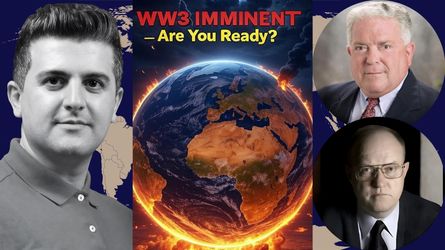
Col. Larry Wilkerson & Chas Freeman: WW3 IMMINENT, Shocking Signs, We're on the Brink of Global War!
01:09:28|Nima Rostami Alkhorshid:What is happening between the Houthis and Israel?Why are the Yemenis so difficult to deal with militarily?How is the situation in Syria being interpreted differently by the US and Israel?Why is Turkey unable to communicate its difficulties in Syria with the US?What are the implications of the recent military pact between the UK and Germany?Amb. Chas Freeman:The Houthis have shut down the port of Eilat and occasionally attack Ben-Gurion Airport, taking concrete actions under the Genocide Convention.The Yemenis are resilient and adept at differentiating between commercial ships, causing significant damage and economic impact.The US and Israel have different interpretations of the Syrian situation, with Israel occupying territory and Turkey upset by Israeli actions.Turkey's leverage with the US is limited, especially under the current administration, leading to uncertainty and fear internationally.The UK-Germany pact reflects historic tensions and could lead to an escalation similar to pre-WWI alliances.Col. Larry Wilkerson:The Houthis have taken actions against Israeli ports, impacting economic stability, and are considered indomitable.Yemenis are resilient and have a history of courteous banditry, making them tough adversaries despite limited military power.The situation in Syria involves Israeli occupation and internal disputes, with the Syrian army attempting to mediate.The US's unpredictable foreign policy and military behavior cause concern among international leaders.The military pact between the UK and Germany highlights strategic threats and historical parallels, raising concerns about potential conflicts.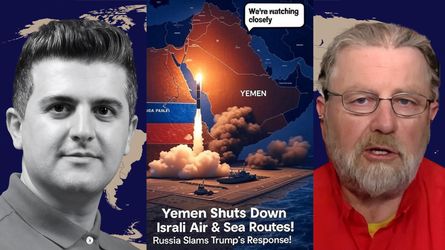
Larry C. Johnson: Yemen CUTS OFF Israel's Airport and Eilat Port-Russia's Bombshell Reply to Trump
01:21:53|Nima Rostami Alkhorshid:What is your perspective on Yemen's capability to impact Israeli ports?How do you assess the potential for international sanctions on Israel?What role do you see Iran playing in regional air defense strategies?How do you interpret the dynamics between the Druze community and Israeli military integration?What are your thoughts on the impact of Western military support for Ukraine?Larry C. Johnson:Yemen’s actions reflect resilience and determination despite challenges.Sanctions could gain traction but depend on global political alignment.Iran’s air defense priorities focus on comprehensive threat interception.The Druze community’s stance is evolving, with some identifying more as Palestinian.Western support for Ukraine has limitations and risks turning the country into a proxy battleground.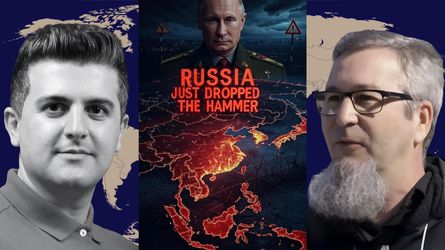
Dmitry Orlov: RUSSIA JUST DROPPED THE HAMMER Warning the West
01:05:00|Nima Rostami Alkhorshid:Can you summarize the key points of Dimitri Orlov’s recent article “How Donald Went to War”?What is Orlov’s perspective on Trump’s ability to influence the outcome of the Ukraine conflict?How does Orlov view the MAGA movement and its impact on U.S. foreign policy?What challenges does Orlov identify in revitalizing U.S. industry, especially regarding gender roles and drug use?How does Orlov foresee Russia handling the future of Ukraine, particularly the Western region?Dmitry Orlov:The article critiques U.S. involvement in Ukraine as misguided, predicting inevitable Russian victory and NATO defeat. It also highlights Trump’s inability to change the trajectory of the conflict.Trump cannot significantly alter the Ukraine situation because he lacks leverage over Ukraine or Russia, and U.S. support for Ukraine is depleting resources needed elsewhere, like in Israel.MAGA has failed both domestically and internationally; Trump’s policies were unrealistic, and his administration has largely abandoned fiscal conservatism while failing to reduce U.S. global entanglements.U.S. industrial decline is tied to cultural shifts favoring women and soft skills, along with widespread drug use, making it difficult to rebuild a disciplined workforce necessary for manufacturing.Russia will likely demilitarize and denazify eastern Ukraine, while the western part may become depopulated and lawless, eventually resettled by Russia if left unclaimed by the West.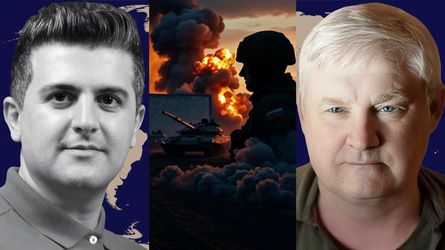
Andrei Martyanov: It's OVER, Russia Plans to End It All on the Battlefield!
01:05:16|Nima Rostami Alkhorshid:What is your assessment of the current geopolitical tensions involving Ukraine and Russia, particularly regarding cross-border military actions?How do you evaluate the technological and military capabilities of Western nations compared to Russia and other global powers?What are the implications of U.S. involvement in Ukraine for global strategic balances and international relations?How do you perceive the leadership qualities of key political figures like Donald Trump and their impact on foreign policy decisions?What is your view on the potential for broader military conflicts, such as a possible World War III, given current global tensions?Andrei Martyanov:The situation involving Ukraine and Russia is marked by significant military escalation, with deep strikes into Russian territory raising concerns about further conflict expansion. However, these actions are not new, as Ukraine has been conducting such operations for some time.Western nations, particularly the U.S., still possess significant technological capabilities, especially in space and unmanned systems, but their military-industrial capacity is declining. European countries, like Germany, lack the ability to produce advanced military systems, and even France, despite having a credible nuclear deterrent, has limited capacity compared to global powers like Russia and China.U.S. involvement in Ukraine has strained its military and political credibility. The U.S. is seen as being driven by a flawed strategic understanding and is increasingly viewed as being incapable of sustaining large-scale military operations. This has weakened its global influence and exposed internal weaknesses.Figures like Donald Trump are often criticized for lacking genuine strategic understanding and being influenced by personal interests and external manipulation. There is skepticism about the competence of Western leaders, with many being seen as products of a failing system.While there is concern about the potential for larger conflicts, particularly with nuclear-armed powers, the likelihood of a full-scale World War III remains low. Russia, for instance, has shown restraint despite provocations, and the global balance of power makes such a conflict unlikely, though regional confrontations remain a risk.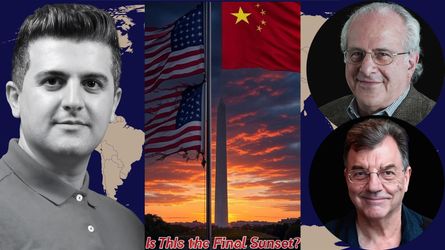
Richard Wolff & Michael Hudson: America's FINAL Days, China Takes the Lead in Global Power Shift!
01:05:10|Nima Rostami Alkhorshid:What is the impact of Trump's policies on universities and public opinion regarding Netanyahu's administration?How does the situation in Israel with Netanyahu's leadership affect Jewish populations globally?What is the implication of European countries' military spending on their economies?How does Trump's approach to Ukraine influence American foreign policy?In what ways does the U.S. competition with China affect the automotive industry?Michael Hudson:Trump's policies attempt to stifle criticism of Netanyahu by influencing academic freedom and public discourse.Netanyahu's leadership polarizes Jewish communities, with many progressive Jews opposing his policies.Increased military spending strains European economies, leading to reduced social spending and economic growth.Trump's approach to Ukraine focuses on economic leverage, pushing European allies to fund and manage the conflict.U.S.-China competition highlights inefficiencies in the American automotive industry, threatening its global standing.Richard Wolff:Trump's policies aim to control narratives around Israel, affecting free speech and academic environments in the U.S.The actions of Netanyahu's government provoke divisions within the global Jewish community, especially among progressive groups.European militarization risks economic downturns as funds are diverted from social programs to defense.Trump's foreign policy in Ukraine emphasizes American economic interests, urging Europe to take more responsibility.The U.S. automotive industry faces significant challenges from Chinese competition, necessitating innovation and policy changes.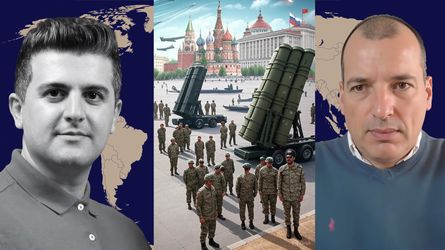
Alex Krainer: IRAN Turning Into an AIR DEFENSE BEAST - China & Russia Just Changed the Game FOREVER!
01:19:07|Nima Rostami Alkhorshid:What is the current situation in Syria, and what role are external powers playing?How is the U.S. relationship with Israel impacting regional stability?What is the significance of the British role in the Middle East?How are Iran-Russia-China relations evolving amid geopolitical tensions?What are the implications of Western actions in Ukraine for global stability?Alex Krainer:The situation in Syria is worsening, with regional rivalries and external interference, particularly from the UK, fueling instability.U.S. support for Israel is increasingly seen as a liability, with some questioning its strategic value amid shifting alliances.The UK is actively involved in stirring conflict, including in Syria, as part of broader efforts to destabilize the region and counter rival powers.Russia, China, and Iran are strengthening cooperation, viewing the West's actions as existential threats, making their alliance more resilient.The war in Ukraine is being prolonged by Western support for Kyiv, with dangerous escalations, including potential nuclear risks, on the horizon.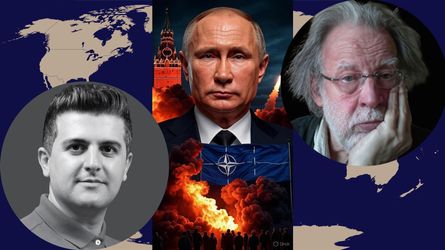
John Helmer: Russia's Oreshnik Moment comes CLOSER
01:05:29|Nima Rostami Alkhorshid:What is the significance of Trump’s reported discussions with Zelensky about attacking Moscow?How does Trump’s approach to Ukraine differ from previous administrations?What role do European allies play in escalating the conflict with Russia?What are the implications of secondary sanctions on countries like China and India?How does Azerbaijan factor into the broader geopolitical conflict involving Russia and Iran?John Helmer:Trump’s reported discussions with Zelensky indicate a potential escalation, but his inconsistent statements and mental capacity raise doubts about U.S. strategy.Trump’s approach mirrors Biden’s in arming Ukraine but adds unpredictability, with threats of direct attacks on Russia and transactional diplomacy.European allies, particularly Germany, are being pressured to fund and supply weapons, effectively acting as intermediaries for U.S. military support to Ukraine.Secondary sanctions on China and India aim to cut off Russia’s oil revenue, but these measures are unlikely to succeed due to strong economic ties.Azerbaijan’s strategic location and tensions with Russia and Iran make it a focal point for external powers like Israel, Turkey, and the U.S., threatening regional stability.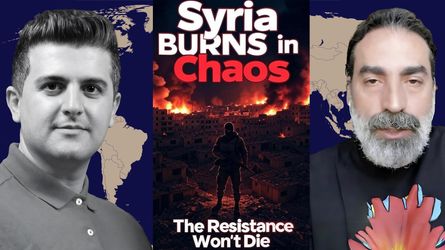
Laith Marouf: Syria BURNS in Chaos-The Resistance Won't Die, Rising from Ashes
49:53|Nima Rostami Alkhorshid:What is happening in Syria, particularly in the region of Sweda?What role do Turkey and Qatar play in the current situation in Syria?How does the Druze population in the Golan Heights interact with events in Syria?What does Israel aim to achieve in the region, especially regarding Syria?What is the significance of Netanyahu’s recent visit to the United States?Laith Marouf:In Syria, particularly in Sweda, there is ongoing conflict involving attacks by HTS and other groups, with Israel appearing to film some events. The Druze population in the region remains resilient and refuses to collaborate with Israel.Turkey and Qatar, through Al Jazeera, appear to be portraying the Druze population in a negative light and are indirectly supporting HTS, which collaborates with Israel despite previous claims of opposing it.The Druze in the Golan Heights, though under Israeli control, maintain strong Syrian identity and have actively resisted Israeli influence, with some even entering Syria to support their kin in Sweda.Israel aims to destabilize Syria by exploiting sectarian divisions and creating excuses for intervention. The Druze resistance in Sweda is seen as a threat to these plans.Netanyahu’s visit to the U.S. focused on securing support, particularly regarding the Epstein investigation and potential military actions. However, the U.S. has limited options without risking global conflict, so Israel may resort to more sectarian and terrorist tactics in the region.
Col. Larry Wilkerson: TRUMP DROPS ULTIMATUM, RUSSIA & IRAN'S NEXT MOVE WILL BLOW YOUR MIND!
01:06:51|Nima Rostami Alkhorshid:What is your perspective on the recent developments in U.S.-Russia relations following Trump's ultimatum?How do you interpret the internal divisions within MAGA and their implications for Trump's foreign policy?Can you analyze the potential consequences of Germany acquiring long-range missiles for the Ukraine conflict?How might the ongoing conflict in Gaza affect regional stability and international diplomacy?What are your thoughts on the recent polls indicating increased support for the Iranian government despite external pressures?Col. Larry Wilkerson:The recent developments in U.S.-Russia relations reflect a complex interplay of domestic politics and international strategy, with Trump's ultimatum likely aimed at appeasing his base rather than achieving concrete diplomatic outcomes.The internal divisions within MAGA highlight the challenges Trump faces in maintaining cohesion among his supporters, especially as key figures like Tucker Carlson challenge the narrative, which could undermine his foreign policy initiatives.Germany acquiring long-range missiles could escalate tensions in the Ukraine conflict, potentially provoking a stronger response from Russia and complicating diplomatic efforts to de-escalate the situation.The ongoing conflict in Gaza risks further destabilizing the region, exacerbating humanitarian crises, and straining international relations, particularly as global public opinion increasingly turns against Israel's actions.The recent polls suggesting increased support for the Iranian government may reflect a rally-around-the-flag effect in response to external pressures, but they may not fully capture the complexities of internal dissent and economic challenges faced by the regime.